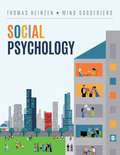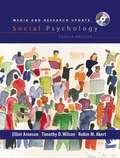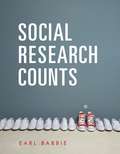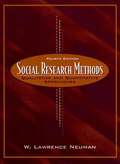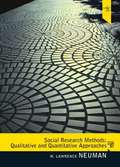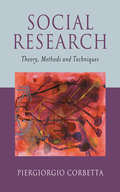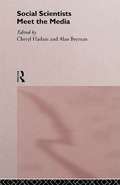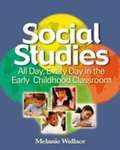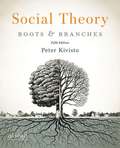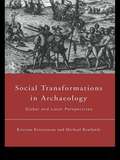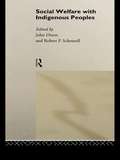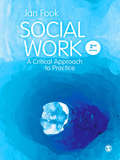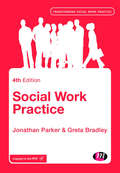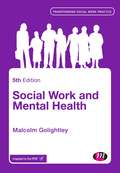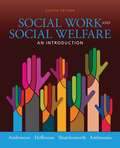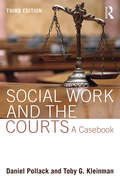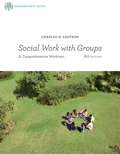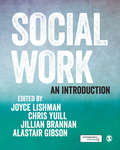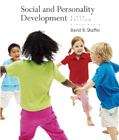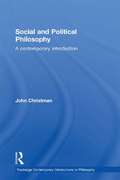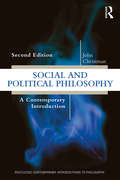- Table View
- List View
Social Psychology (Sixth Edition)
by Stephen FranzoiLearn more about group psychology and dynamics.
Social Psychology: Critical Thinking And Application
by Dr Thomas Heinzen Dr Wind GoodfriendInvite your students to discover social psychology’s relevance to their lives with Social Psychology, a new introduction to the field from award-winning teacher-researchers Tom Heinzen and Wind Goodfriend. The authors present social psychology as an evolving, science-driven conversation. Every chapter builds on core questions central to scientific inquiry, while a methods-in-context approach cultivates psychological literacy. Heinzen and Goodfriend draw students in by weaving stories drawn from their own personal experiences with compelling examples from popular culture, all carefully placed in historical context. Because application is key, the book concludes with eight mini-chapters on topics including behavioral economics, environmental sustainability, law and the courtroom, positive psychology, and more. Students will become active participants in the social psychology dialogue, finding their fascination with the field and realizing its significance in their daily lives and future careers.
Social Psychology: Critical Thinking And Application
by Dr Thomas Heinzen Dr Wind GoodfriendInvite your students to discover social psychology’s relevance to their lives with Social Psychology, a new introduction to the field from award-winning teacher-researchers Tom Heinzen and Wind Goodfriend. The authors present social psychology as an evolving, science-driven conversation. Every chapter builds on core questions central to scientific inquiry, while a methods-in-context approach cultivates psychological literacy. Heinzen and Goodfriend draw students in by weaving stories drawn from their own personal experiences with compelling examples from popular culture, all carefully placed in historical context. Because application is key, the book concludes with eight mini-chapters on topics including behavioral economics, environmental sustainability, law and the courtroom, positive psychology, and more. Students will become active participants in the social psychology dialogue, finding their fascination with the field and realizing its significance in their daily lives and future careers.
Social Psychology: Media and Research Update (4th Edition)
by Elliot Aronson Timothy Wilson Robin MakertArticles on Social psychology
Social Research Counts
by Earl BabbieBecome a competent, confident, and critical consumer of social research with Earl Babbie's SOCIAL RESEARCH COUNTS. Written with wit, and with a desire to see you succeed in the course, the book presents the main tenets of research methods concisely and in a visually appealing, full-color format that engages you in the topics and helps you make the connection between a concept and its real-world applications. Each chapter includes features designed to guide you through the material, including Learning Objectives that offer you an easy-to-follow guide to the content, as well as "Tips and Tools" and "Research in Real Life" boxes that provide opportunities for you to better equip yourself with relevant skills. As a result of using this book, you will gain a firm footing in the foundational skills and principles of research methods.
Social Research Methods: Qualitative and Quantitative Approaches (4th edition)
by W. Lawrence NeumanThis book offers students balanced coverage of both the qualitative and quantitative approaches to social research. It teaches them to guard against ethnocentric perspectives and confining their research on the assumptions of their own society.
Social Research Methods: Qualitative and Quantitative Approaches (7th Edition)
by W. Lawrence NeumanThis text presents a comprehensive and balanced introduction to both qualitative and quantitative approaches to social research with an emphasis on the benefits of combining various approaches.
Social Research: Theory, Methods and Techniques
by Piergiorgio Corbetta`This is an impressively detailed, clearly written book.... It is a book that I would like students to read' - Clive Seale, Goldsmiths College, London Social Research: Theory, Methods and Techniques presents an understanding of social research practice through appreciation of its foundations and methods. Stretching from the philosophy of science to detailed descriptions of both qualitative and quantitative techniques, it illustrates not only `how' to do social research, but also `why' particular techniques are used today. The book is divided into three parts: Part One: Illustrates the two basic paradigms - quantitative and qualitative - of social research, describing their origins in philosophical thought and outlining their current interpretations. Part Two: Devoted to quantitative research, and discusses the relationship between theory and research practice. It also presents a discussion of key quantitative research techniques. Part Three: Examines qualitative research. Topics range from classical qualitative techniques such as participant observation, to more recent developments such as ethnomethodological studies. Overall, the author offers an engaging contribution to the field of social research and this book is a reminder of the solid foundations upon which most social research is conducted today. As a consequence it will be required reading for students throughout the social sciences, and at various levels.
Social Scientists Meet the Media
by Alan Bryman Cheryl Haslam"Part chronicle, part analysis and part advice manual, Social Scientists Meets the Media combines the thoughts of academics and media people to produce a vivid and valuable series of accounts that will prove of service to all academics seeking a wider audience but wary of the terra incognita they face in finding one" Ellis Cashmore, Staffordshire UniversitySocial Scientists know they are in a dilemma: their work may fall prey to sensationalism, but at the same time they don't want to be overlooked. Social Scientists Meet the Media collects the experiences of academics who have sought to publicize their research. It contains personal accounts from social scientists with extensive media contact and representatives from radio, television and the press. Based on these often humorous and sometimes chastening accounts, the editors suggest ways to achieve a more fruitful relationship between social scientists and the media.
Social Studies: All Day, Every Day in the Early Childhood Classroom
by Melanie WallaceSocial Studies - All Day, Every Day, is a research based text containing the latest research on learning styles, reading and math, and best practices. In light of the recent No Child Left Behind legislation, many teachers of young children are opting out of teaching social studies in favor of spending more time on reading and math instruction. Not only is this inappropriate and unfair to the students, it is unnecessary. In this text, the reader will discover ways to study in-depth, a wide range of the social studies, while spending the necessary time and intellectual energy developing reading and mathematical skills. The opening chapters of the text define the social studies and describe the National Council of Social Studies (NCSS) standards as they relate to teaching young children. The remainder of the text breaks down teaching methodology for working with young children and the social studies, and looking at individual disciplines within the social studies. Practical application, with a theoretical base, is the key to this text.
Social Theory: Roots And Branches (Fifth Edition)
by Peter KivistoEdited by Peter Kivisto, this acclaimed collection of accessible primary source readings enables students to experience "firsthand" a wide range of perspectives that are shaping current sociological theory. Now in its fifth edition, Social Theory: Roots and Branches covers both classical theory (the roots) and contemporary theory (the branches) and shows how they are linked. Part One features work from such well-known classical theorists as Marx, Durkheim, Weber, and Simmel. It also presents selections by theorists outside of the discipline and from writers who are often overlooked in competing collections, including W. E. B. Du Bois, Charlotte Perkins Gilman, and Harriet Martineau. Part Two offers readings that illustrate major contemporary theoretical approaches, ending with a section on cutting-edge directions in theoretical discourse. Now featuring a revised and expanded introductory chapter, this fifth edition offers seventeen new readings, including eight by theorists who are new to this collection.
Social Transformations in Archaeology: Global and Local Perspectives (Material Cultures)
by Kristian Kristiansen Michael RowlandsSocial Transformations in Archaeology explores the relevance of archaeology to the study of long-term change and to the understanding of our contemporary world. The articles are divided into: * broader theoretical issues * post-colonial issues in a wide range of contexts * archaeological examination of colonialism with case studies from the Mediterranean in the first millenium BC and historical Africa.
Social Welfare with Indigenous Peoples (Comparative Social Welfare Series)
by John Dixon Robert P. ScheurellIn many areas of the world, there has been an earlier indigenous population, which has been conquered by a more recent population group. In Social Welfare with Indigenous Peoples, the editors and contributors examine the treatment of many indigenous populations from five continental areas: Africa (Sierra Leone, Zimbabwe); Australasia, New Zealand; Central and South America (Brazil, Mexico); Europe (Scandinavia, Spain) and North America. They found that, regardless of whether the newer immigrants became the majority population, as in North America, or the minority population, such as in Africa, there were many similarities in how the indigenous peoples were treated and in their current situations. This treatment is examined from many perspectives: political subjugation; negligence; shifting focus of social policy; social and legal discrimination; provision of social services; and ethnic, cultural and political rejuvenation.
Social Work
by Jan FookSocial work is a human profession founded on social justice. It is difficult however to negotiate this in the constantly-changing context of the twenty first century. Now in its' second edition, this book considers the critical tradition of social work and updates it with postmodern thinking. Jan Fook draws on critical reflection to help social workers deliver flexible, responsible and responsive practice and to celebrate the ageless ideals of the profession. Key ideas covered in the text include: - Postmodernism - Critical theories - Critical reflection - Contextuality The author draws on her own experiences, to relate theoretical ideas to real life. Summaries, exercises and further reading are also included in each chapter. The book will be essential reading for all undergraduate students of social work. It will also be a valuable resource for postgraduate students and qualified professionals, who want to revisit the critical tradition of social work.
Social Work Practice
by Jonathan Parker Greta BradleyThis bestselling book takes the student step-by-step through the core processes of social work. It introduces four essential elements (assessment, planning intervention and review) in a clear manner, and is structured in a chronological way that is easy to understand yet holistic in approach. The authors use Assessment as a lynchpin for the book and use various assessment tools (some of which they have developed themselves) to illustrate the links between theory and practice. An essential introduction to the fundamental principles of social work practice, this title has been fully-revised to link directly to the Professional Capabilities Framework for Social Work. Key updates: New Material on Personalisation Agenda Greater emphasis on social work in the community More research material on working with children Updated case studies throughout Part of the Transforming Social Work Practice series. All books in the series are affordable, mapped to the Social Work Curriculum, practical with clear links between theory & practice and written to the Professional Capabilities Framework.
Social Work and Mental Health
by Malcolm GolightleyThis new edition provides a thorough grounding in the key issues in mental health. It highlights the key issues in this complex and sensitive area of practice and helps students to understand the latest policy and practice issues. The book looks at various aspects of Mental Health Law including the Mental Capacity Act 2005 and the recent amendments to the 1983 Mental Health Act. The author is careful to apply these laws to everyday practice in an accessible and user-friendly way. This new edition includes updates to key policy areas such as Putting People First (2007) and No Voice (2007).
Social Work and Social Welfare: An Introduction 8th Edition
by Guy Shuttlesworth Robert Ambrosino Rosalie Ambrosino Joseph HeffernanIntegrating the latest accreditation standards and practices from the field, the eighth edition of bestselling SOCIAL WORK AND SOCIAL WELFARE gives readers a solid understanding of the social work profession and the role the profession plays in the social welfare system. In keeping with the current Council on Social Work Education's Educational Policy and Accreditation Standards, the book presents a generalist practice perspective in addressing social welfare issues within the context of the systems/ecological framework, the overarching framework used by generalist practitioners as they intervene to address social welfare needs at the individual, family, group, organization, community, and societal levels. Illustrating that there are many reasons why social problems occur, the book explores the history, values, and economic, political and cultural factors that surround these issues, as well as the attempts to solve or address them. Completely current, the eighth edition also includes updates on such key issues as health care, mental health, immigration, and criminal justice.
Social Work and the Courts: A Casebook
by Daniel Pollack Toby G. KleinmanSocial Work and the Courts is a collection of important and cutting-edge court decisions in the field of human services, now in its third edition. Pollack and Kleinman present an array of legal cases in everyday language, with clear explanation of the facts and issues, and in-depth examinations of the reasoning and implications of each decision. This new edition includes over twenty new cases, all of which happened between 2010 and 2014, making this one of the most significant and timely investigations of how social work and the law intersect. Special attention is paid to recent rulings in child welfare and social worker liability. The dissection and analysis of these influential cases makes this volume an excellent teaching tool and an essential resource for both social workers and policy makers.
Social Work with Groups: A Comprehensive Worktext (8th edition)
by Charles H. ZastrowUsing a plentiful selection of skill-building and self-evaluation exercises, author Charles Zastrow's comprehensive, workbook-style text promotes his philosophy that you can learn group leadership skills best by practicing them in class. In this eighth edition of SOCIAL WORK WITH GROUPS: A COMPREHENSIVE WORKBOOK, Zastrow discusses topics central to a successful understanding of group leadership: stages of groups, group dynamics, verbal and nonverbal communication, types of groups, and diversity in groups. When you participate in groups, the classroom becomes a "lab" where you can experience what it's like to work in and lead the many kinds of groups the author discusses.
Social Work: An Introduction
by Alastair Gibson Chris Yuill Jillian Brannan Joyce LishmanSocial Work: A Introduction is designed to help your students make the best start in their academic and professional careers. Mapped throughout to the most up-to-date professional standards, the book covers the full range of knowledge and skills students need to gain in the early stages of their social work course and as they prepare to go out on placement. Key Learning Features: Key Themes and Chapter Introductions - to set the scene and place each chapter in context. Case Studies and Practice Vignettes - illustrate how theory, knowledge and policy translate to real-life practice. Also help students consider the service-user's experience and develop a holistic approach to care. Exercises, Activities and Reflective Questions - independent learning tasks to help students apply theory to their practice, and to develop their skills of critical reflection Critical Thinking Boxes - support your students in their journey towards becoming critically reflexive practitioners. Visit the companion website to access a range of resources to support both lecturers and students, including: Vodcasts and podcasts from students, lecturers, service users and authors to introduce key topics to audio and visual learners Activities and case studies from different fields and settings to show how theory translates into real life practice Selected SAGE journal articles to help take learning to the next level Up-to-date links to codes of ethics, frameworks and other useful resources.
Social and Personal Ethics (Eighth Edition)
by William H. ShawSOCIAL AND PERSONAL ETHICS provides students with a sound introduction to ethical theory and contemporary moral issues through engaging readings on today's most hotly debated topics. Among other topics, coverage includes environmental ethics and animal rights, the limits of personal liberty, war and the struggle against terrorism, marriage and sexual morality, the death penalty, gun control, and abortion and euthanasia. The volume begins with two introductory essays written for beginning students by the editor, William H. Shaw, on the nature of morality and competing normative theories. These are followed by five other essays on ethical theory by classical and contemporary authors. The book's next 12 sections explore a wide-range of real-world ethical issues. In all, the book is composed of 53 articles (11 of which are new to this edition). To ensure that the text is as accessible as it is relevant, Shaw has edited every article with an eye toward readability, provided introductions and study questions before the essays, as well as review and discussion questions after them, and highlighted key passages to help students focus on important points and concepts.
Social and Personality Development (6th Edition)
by David R. ShafferThe 6th edition of Social and Personality Development features clearly written, current coverage of social and personality development that aids students in discovering the causes, processes, and complexities that underlie developmental change.
Social and Political Philosophy: A Contemporary Introduction
by John ChristmanThis accessible and user-friendly text will prove invaluable to any student coming to social and political philosophy for the first time. It provides a broad survey of fundamental social and political questions in modern society, as well as clear, accessible discussions of the philosophical issues central to political thought.Topics covered include: the foundations of political authority, the nature and grounds of economic justice, the limits of tolerance, considerations of community, race, gender, and culture in questions of justice, and radical critiques of current political theories.
Social and Political Philosophy: A Contemporary Introduction (Routledge Contemporary Introductions to Philosophy)
by John ChristmanThis accessible book is invaluable to anyone coming to social and political philosophy for the first time. It provides a broad survey of key social and political questions in modern society, as well as clear discussions of the philosophical issues central to those questions and to political thought more generally. Unique among books of this kind is a sustained treatment of specifically social philosophy, including topics such as epistemic injustice, pornography, marriage, sexuality, and the family. The relation between such social questions and specifically political topics is discussed. These topics include: political authority, economic justice, the limits of tolerance, considerations of community, race, gender, and culture in questions of justice, and radical critiques of current political theories. Updates to the Second Edition emphasize the non-statist areas of the subject and include two brand new chapters on social philosophy and transnational justice. This Second Edition also includes revisions throughout and coverage of recent theoretical discussions and world events.
Socialism & Marginalism in Economics 1870 - 1930 (Routledge Studies in the History of Economics)
by Ian SteedmanFirst published in 1995. Routledge is an imprint of Taylor & Francis, an informa company.

